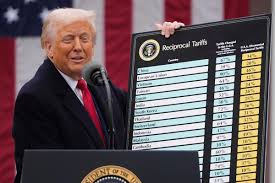The ongoing trade tensions between the United States and China continue to make waves in the global economy, impacting various industries and markets. President Trump's recent announcements regarding tariffs and exemptions have caused confusion and uncertainty, especially in the tech sector.
Initially, there were reports that smartphones, computers, and certain electronics would be excluded from tariffs. However, Trump later clarified that these products would not receive exemptions. This flip-flopping of decisions has left many businesses and consumers puzzled about what to expect next.
The trade conflict between the two economic powerhouses has escalated, with retaliatory actions leading to increased tariffs on both sides. The uncertainty surrounding trade policies has had a significant impact on investor sentiment, reflected in the volatility of the stock market.
Despite the imposition of tariffs, there are considerations for possible exemptions, such as in the case of auto parts. Trump mentioned that car companies might need additional time to transition to using domestically made parts, hinting at a potential short-term exemption from tariffs. However, the baseline tariffs imposed earlier remain in place for affected imports.
The impact of tariffs goes beyond just the products directly affected. Studies have shown that consumers end up bearing the brunt of increased costs resulting from tariffs. Businesses, especially small to medium-size enterprises, are adjusting their pricing strategies to offset the higher costs incurred due to tariffs on imported goods.
The global ramifications of the trade war are being felt across different industries. Countries like Japan and Taiwan are navigating their trade relationships with the US amid the evolving tariff landscape. The UK has taken steps to address the impact of tariffs on its businesses, while China's decision to halt the export of rare earth minerals underscores the strategic moves being made in response to trade tensions.
In the US, sectors like agriculture and technology are particularly sensitive to the trade dispute. American soybean farmers are feeling the pressure as China seeks alternative sources of soybeans, presenting an opportunity for countries like Brazil to fill the gap in the global market.
The exemption of certain electronic products from tariffs has provided a temporary reprieve for tech companies and consumers. However, the uncertainty surrounding future tariff decisions continues to weigh on market stability and investor confidence.
As the trade war plays out, experts express concerns about the potential economic impact, with some warning of a recession if trade tensions are not resolved effectively. The fluidity of the situation and the back-and-forth nature of policy decisions contribute to the unease in the financial markets.
In conclusion, the ongoing trade dispute between the US and China remains a critical issue with far-reaching implications for businesses, consumers, and global trade relationships. Navigating the complexities of tariffs, exemptions, and potential impacts requires a deep understanding of shifting dynamics in international trade. Stay tuned for further updates as the trade war continues to unfold and influence the global economy.


